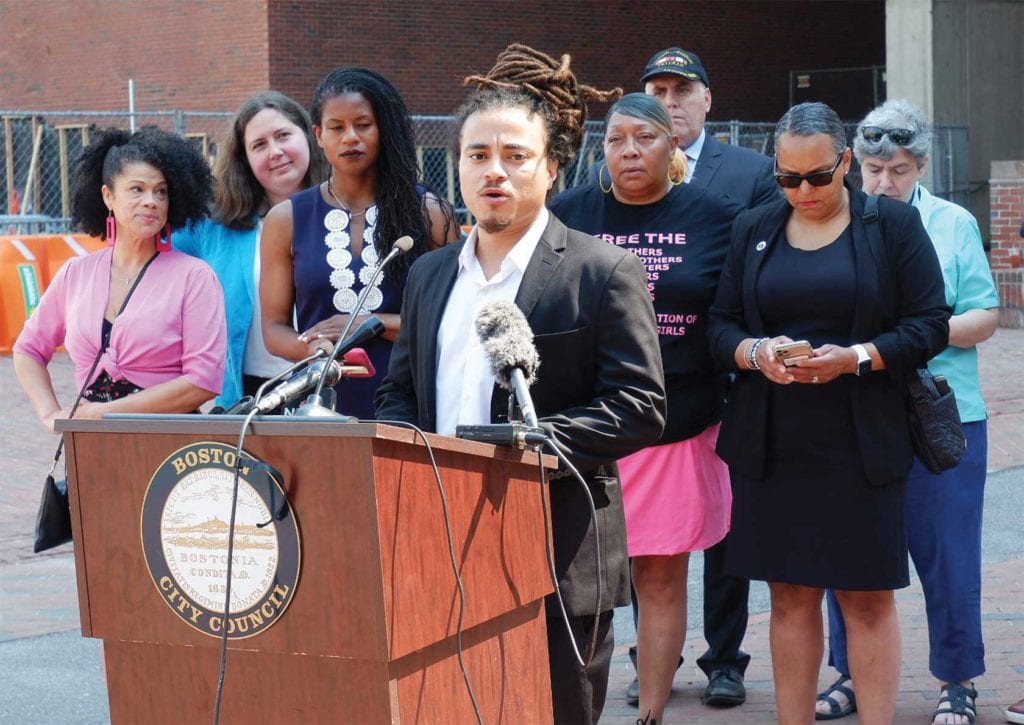Janey signs off on changes to city charter
Proposed changes would give council more input on budget

Acting Mayor Janey signed an ordinance on Monday giving Boston’s voters a chance to amend the city charter this November, granting the City Council and city residents more power in the budget process. The morning it was signed, councilors and activists gathered in front of City Hall to thank Janey and begin their campaign to get voters on board.
The charter amendment allows City Council to line-item veto parts of the mayor’s budget and creates an Office of Participatory Budgeting. Currently, the council must vote yes or no on the mayor’s entire proposed budget, with no power to change parts of it. The city already allocates $1 million for youth to control a participatory budgeting process. With this charter change, the mayor will allocate another $1 million fund for participatory budgeting every year.
The amendment must be approved by Attorney General Maura Healey before it can be added to the ballot in the Nov. 2 election.
Currently, the mayor can introduce a budget, but the council cannot. In December, Councilor Lydia Edwards proposed to make the council’s budgeting power equal to the mayor’s, but that element was removed in the hearing process.
“We have changed the language to ‘together’ so that we’re working with the mayor. That’s what I believe in,” Edwards said in response to questions about the original amendment.
The city of Boston runs under a “strong mayor” system, and Edwards said she wanted to make sure that the amendment wouldn’t run into any constitutional or city charter issues when it gets to the attorney general’s desk.
Now the campaign for voters to vote “yes” on this measure begins. Activists who are part of a new coalition to get the charter amendment passed spoke at the press conference to launch the “Rewrite the Rules” movement.
“There’s people who are super excited about this way of budgeting that we’re trying to pull into this growing coalition,” said Armani White, director of campaigns for the Center for Economic Democracy.
Others voicing support on Monday included Karen Chen, executive director of the Chinese Progressive Association; Andrea James, founder of Families for Justice as Healing; and Andres Del Castillo, organizer for Right to the City.
Del Castillo said the coalition will be working as fast as they can to engage the community on the potential for this new budgeting process.
“We say ‘seat at the table.’ It’s very metaphorical at times. This is real and tangible. Community will be able to engage in a process around participatory budgeting, that they can allocate funds to the priorities they see fit in our city,” he said.
This opportunity, he said, should drive the community to vote yes.
Edwards said a lot of education will be needed to make sure the public is aware of this historic change. But when asked if she is worried about civic engagement on this issue, she said no.
Edwards and Chen both underscored the history of participatory budgeting discussions at the city level.
They thanked the late Chuck Turner, the former city councilor who led on this issue during his term from 1999 to 2010, and Mel King, former state legislator and candidate for mayor.
“We were in rooms years ago, discussing that the way to truly, systemically reform how Boston runs, we must go right to our rules, we must rewrite those rules,” Edwards said during her speech.
The conversation around participatory budgeting kicked up again last June after most of the councilors of color voted against former Mayor Martin Walsh’s budget, calling on him to cut more of the Boston Police Department’s budget. Edwards was the only Black councilor who voted “yes” on Walsh’s budget, even though at the time she said she was not satisfied with it, especially since the council only had the options of “yes” or “no.”
At Monday’s event, she said those standing behind her had told her to “do better.”
“Thank you for demanding more of me. Without your demand, I would not have risen to this occasion,” Edwards said.
Though her original proposal did not pass the council, the revised version was successful and will be on the attorney general’s desk for a maximum of four weeks before a final decision is made.






